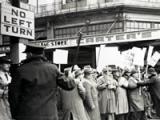Events In History
Keith Holyoake led the National Party to victory over Walter Nash’s Labour government. He went on to become New Zealand’s third longest-serving prime minister, behind Richard Seddon and William Massey.
The Labour government led by Peter Fraser was defeated by Sidney Holland’s National Party after 14 years in office. The result heralded a long period of National dominance, with the party holding power for 29 of the next 35 years.
Following their crushing defeat by the Labour Party in the 1935 general election, the remnants of the United–Reform coalition government met in Wellington to establish a new ‘anti-socialist’ party.
Articles
State housing
New Zealand's first state house was formally opened on 18 September 1937. But the government has provided rental housing for New Zealanders for more than a century. Explore the history of this country's various state housing schemes and their contribution to the New Zealand way of life.Read the full article
Page 3 - The state steps in and out
The National government introduced full market rents in 1991 to reduce the state role in housing provision. From the start, public debate over state housing policy in New Zealand
The 1951 waterfront dispute

The 1951 waterfront dispute was the biggest industrial confrontation in New Zealand’s history. Although it was not as violent as the Great Strike of 1913, it lasted longer – 151 days, from February to July – and involved more workers.Read the full article
Page 1 - The 1951 waterfront dispute
The 1951 waterfront dispute was the biggest industrial confrontation in New Zealand’s history. Although it was not as violent as the Great Strike of 1913, it lasted longer – 151
Page 4 - Division and defeat
The watersiders’ militancy had isolated them from most unionists and Walter Nash’s Labour Party Opposition sat uncomfortably on the fence, denouncing government repression but
The 1970s
The 1970s were an era of economic and social change. Global oil shocks hit the New Zealand economy hard, while protests against the Vietnam War and nuclear testing continued. A new generation of activists raised questions about race relations, sexuality and the welfare system in New Zealand.Read the full article
Page 2 - Overview
Summary of what NZ was like in the 1970s, including our population, economy, popular culture, protest issues, politics and sporting
The New Zealand Legion
The year 1933 witnessed an unprecedented eruption of protest amongst urban businessmen and professionals in New Zealand. The most prominent manifestation of this protest was a radical conservative movement named the New Zealand Legion.Read the full article
Page 7 - Decline
Internal divisions and resignations over policy had considerably sapped the New Zealand Legion’s strength by the beginning of























